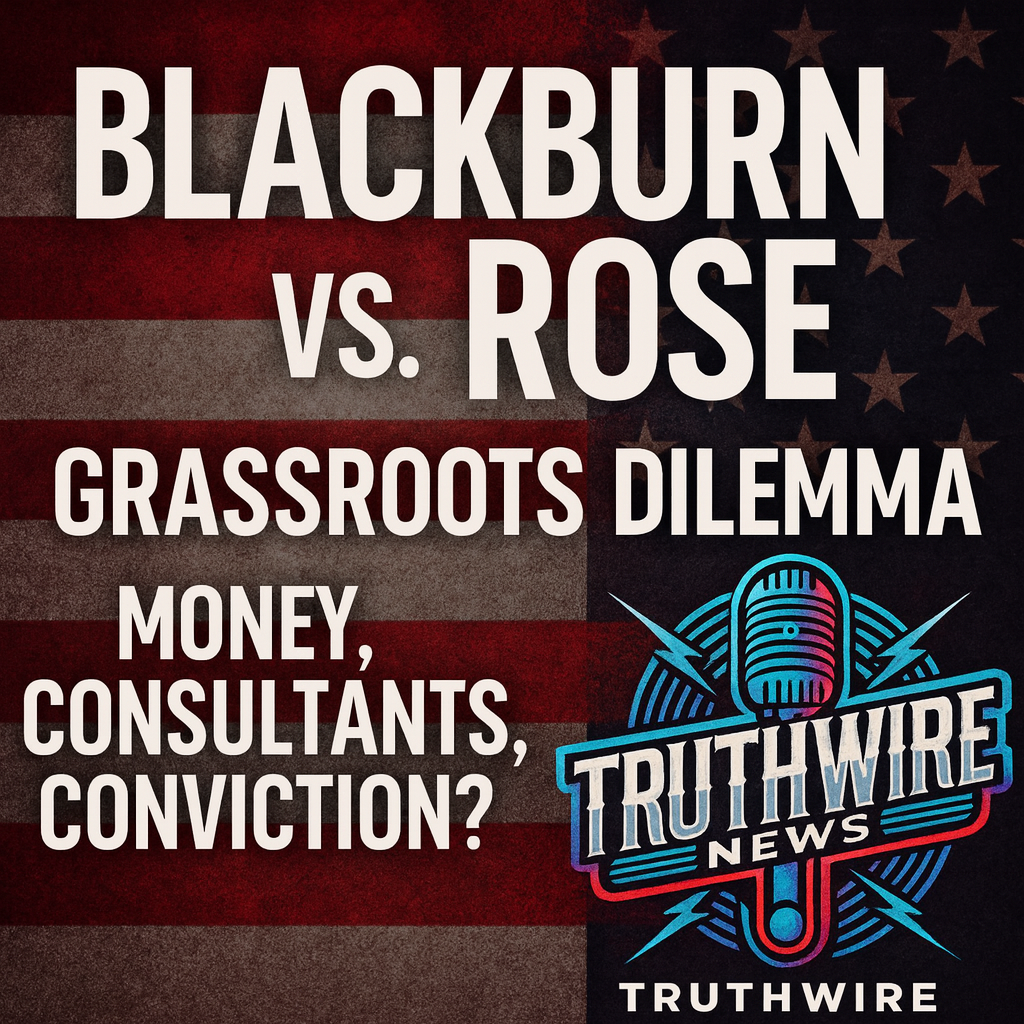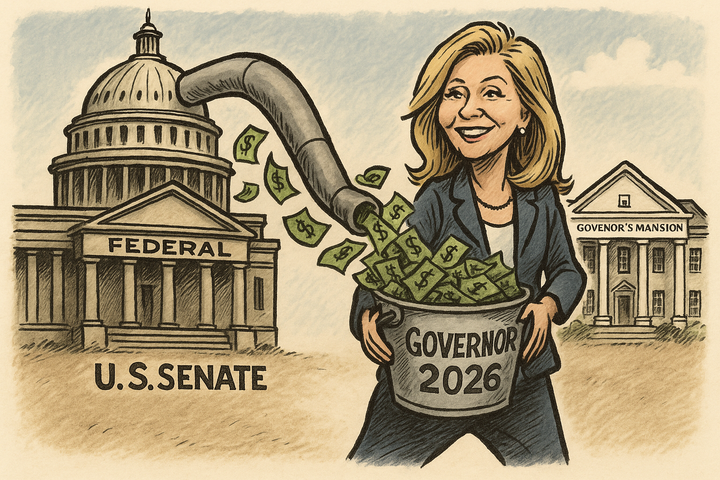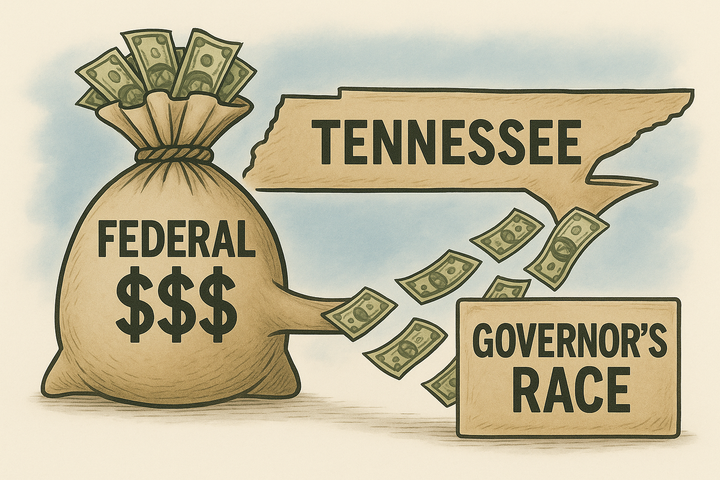Tennessee’s GOP base faces a choice: distrust Blackburn’s consultant machine or doubt Rose’s MAGA conviction. Will grassroots sit it out? And what happens to the down-ballot if they do?
By Kelly Jackson, TruthWire News
Tennessee’s Republican grassroots face a dilemma heading into the 2026 gubernatorial primary: whether to swallow their distrust of U.S. Sen. Marsha Blackburn or overcome their doubts about U.S. Rep. John Rose. Both candidates claim loyalty to former President Donald Trump, but each carries baggage that leaves the base uneasy.
A recent report in the Tennessee Lookout highlighted the stark differences in how Blackburn and Rose are funding their campaigns. Read the original article here.
Blackburn: Consultant-Driven and Establishment-Tied
On paper, Blackburn starts with advantages: name recognition from nearly three decades in Tennessee politics, a large Senate campaign account, and national fundraising connections. But her reliance on federal PACs and establishment consultants is a glaring weak point with the state’s grassroots.
Stockard’s reporting showed Blackburn hasn’t raised money directly into her state account but is instead leveraging PACs such as Making A Responsible Stand for Households in America and Tennessee Victory Fund. Millions have flowed through these entities to consultants like Ward Baker, the veteran strategist who has become shorthand in grassroots circles for “the swamp.”
Blackburn’s PACs have also showered money on establishment figures such as Senate Majority Leader Jack Johnson, while dropping smaller donations across county GOP parties. For activists, that looks less like movement-building and more like consolidating insider influence. Add in eyebrow-raising spending — like $5,000 on New Orleans Saints tickets — and the impression is clear: Blackburn is running a consultant-class campaign, not a grassroots one.
The unease runs deeper. Many activists still haven’t forgiven her for January 6, 2021, when she initially signaled support for objecting to Biden’s certification but ultimately voted to certify the results after the Capitol riot. That decision remains a scarlet letter for MAGA loyalists, confirming their suspicion that Blackburn bends under pressure.
Rose: Self-Funded, Straightforward, but Hesitant
John Rose, by contrast, has taken a more direct path. He loaned his campaign $5 million of his own money and raised an additional $1.1 million largely from Tennessee donors, many with agricultural and small-business ties. His message leans heavily on his outsider image and unwavering defense of Trump, reminding voters that he objected to certification on Jan. 6 — what he calls standing with Trump in his “darkest hour.”
Rose has gained some traction, even beating Blackburn in a recent GOP straw poll. But grassroots conservatives still see gaps in his approach. While Rose hits the right notes on Trump loyalty, he has not forcefully engaged two of the grassroots’ most urgent cause priorities: pandemic accountability and primary reform.
COVID Accountability and the Question of Conviction
Across Tennessee’s conservative base, COVID-era mandates remain a flashpoint. Activists want a governor who will not only oppose future restrictions but also condemn what they see as unnecessary lockdowns, school closures, and mandates in a deep-red state that Trump carried handily three times.
Rose has largely sidestepped the issue. He hasn’t made COVID accountability a signature theme, nor has he criticized Governor Bill Lee’s handling of the pandemic. For grassroots voters, this silence suggests a lack of fight on an issue they view as central to government overreach.
Primaries and the Williamson County Flashpoint
Even more pivotal is the fight over closed primaries. Tennessee’s open system allows Democrats to cross over and vote in Republican primaries, which the grassroots argue dilutes the will of GOP voters and weakens their ability to nominate true America First candidates.
Nowhere is this issue more explosive than Williamson County, the wealthiest county in Tennessee (and 11th in the nation) and the state’s epicenter of grassroots conservative politics. Activists there have made primary reform a non-negotiable litmus test.
The anger reached a boiling point this year when two-thirds of Williamson’s House delegation and Senate Majority Leader Jack Johnson — the county’s lone senator — sponsored/backed legislation that forced open primaries all the way down to the county level. Grassroots Republicans believe Johnson and his allies used slick and ostensibly ethically questionable legislative maneuvers to strip local GOP parties of their right to choose their own nominating process, such as conventions or caucuses.
To many conservatives, it was a blatant attempt to undercut the political momentum of the grassroots movement, which has only grown since 2020, fueled by resentment of COVID-era mandates and establishment maneuvering. In their eyes, the law wasn’t at all about election rules — it was about silencing the very voters who have energized the Tennessee GOP in recent years.
Rose has yet to make closed primaries a signature campaign issue. To activists in Williamson County and beyond, that omission is glaring. In a county where nearly every political conversation circles back to primary reform, candidates who dodge the subject risk losing credibility.
The Grassroots Dilemma
The contrast is striking: Blackburn, the insider candidate, flush with PAC cash and consultant firepower but viewed as untrustworthy by the base. Rose, the outsider with personal funding and Trump credentials, but hesitant on issues that define the grassroots agenda.
The central question for Tennessee conservatives is this: Are Blackburn’s establishment ties, embodied in her partnership with Ward Baker, enough to drive grassroots voters into Rose’s camp — even if Rose hasn’t shown the MAGA zeal they expect on COVID and primary reform?
With Trump himself staying neutral so far, the base is left to wrestle with a difficult choice. Do they back the known insider they distrust, or the outsider they aren’t fully convinced will fight for them?
Or, will conservatives uninspired by anyone at the top of the ticket, simply stay home — further depressing turnout in primaries that are already scraping historic lows? And if that happens, what ripple effect will it have on the rest of the down-ballot races?
The answer will shape not only the GOP primary but also the future of Tennessee’s conservative movement — a movement that prides itself on conviction, not branding.
If you support what I do, please consider donating a gift in order to sustain free, independent, and TRULY CONSERVATIVE media that is focused on Middle Tennessee and BEYOND!





Comments ()